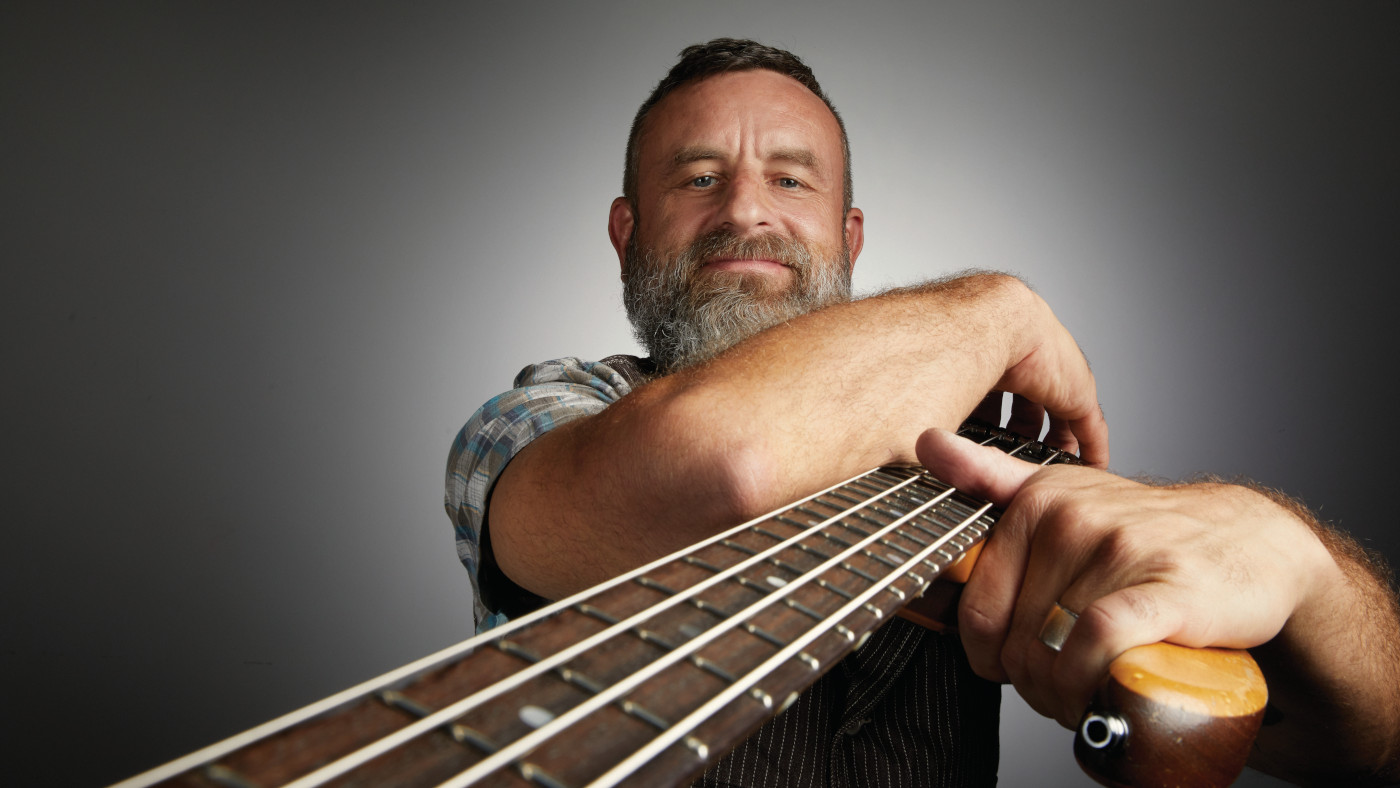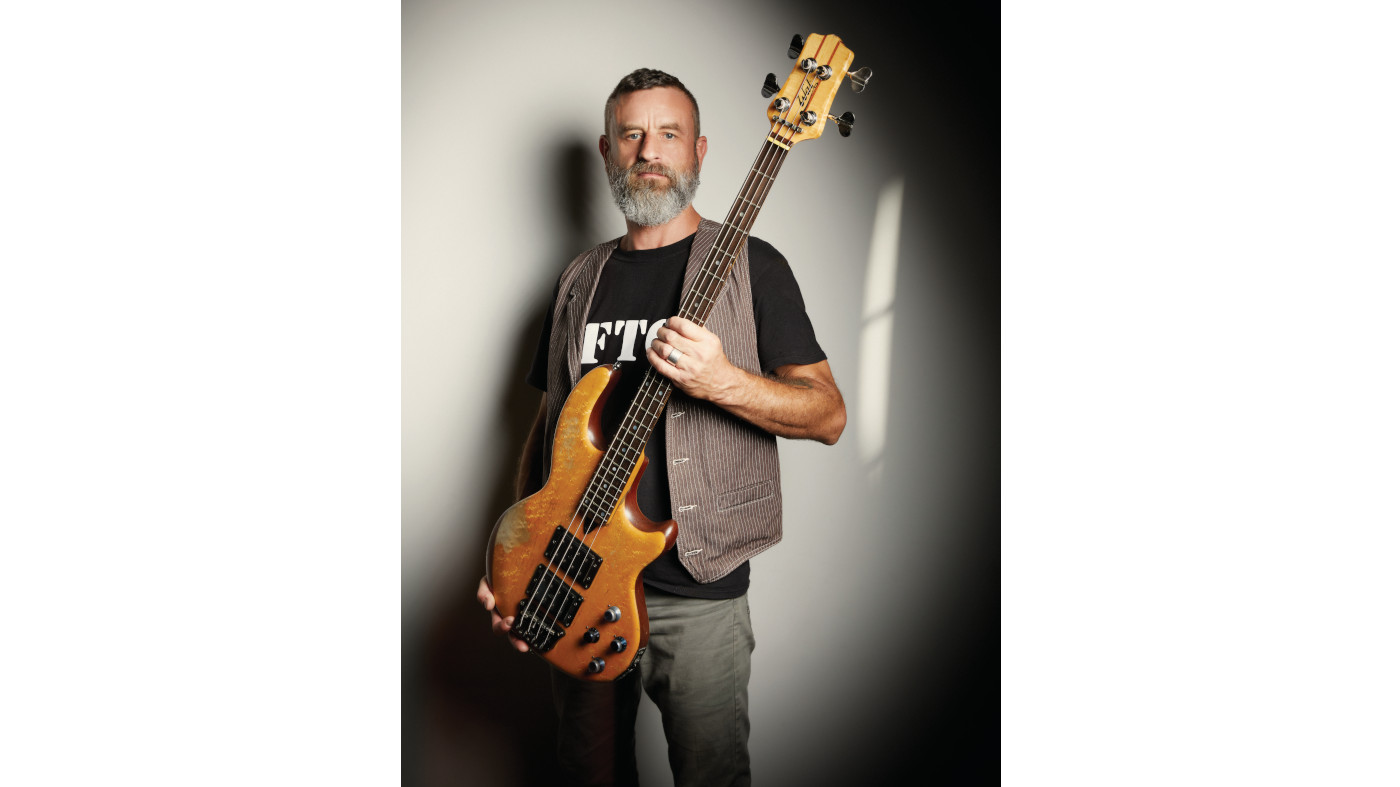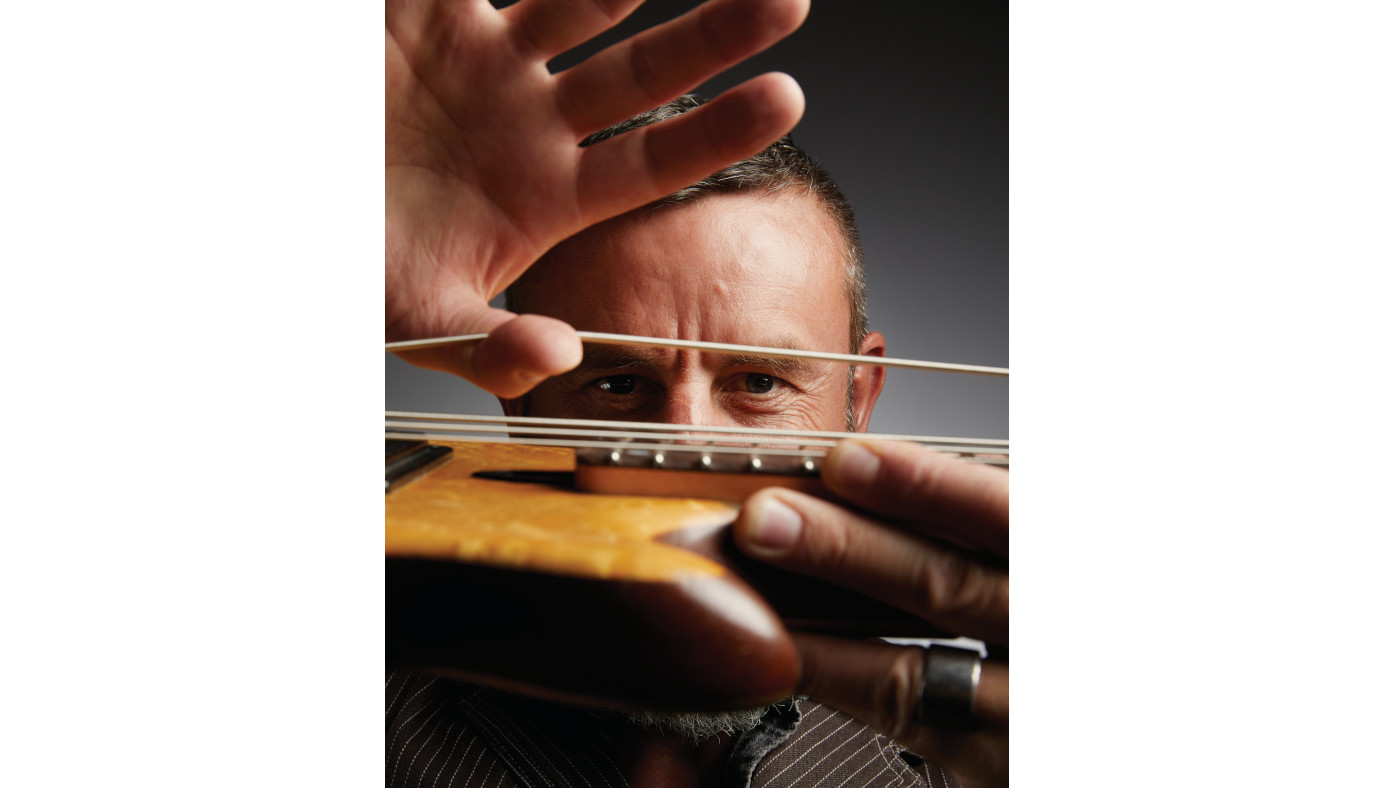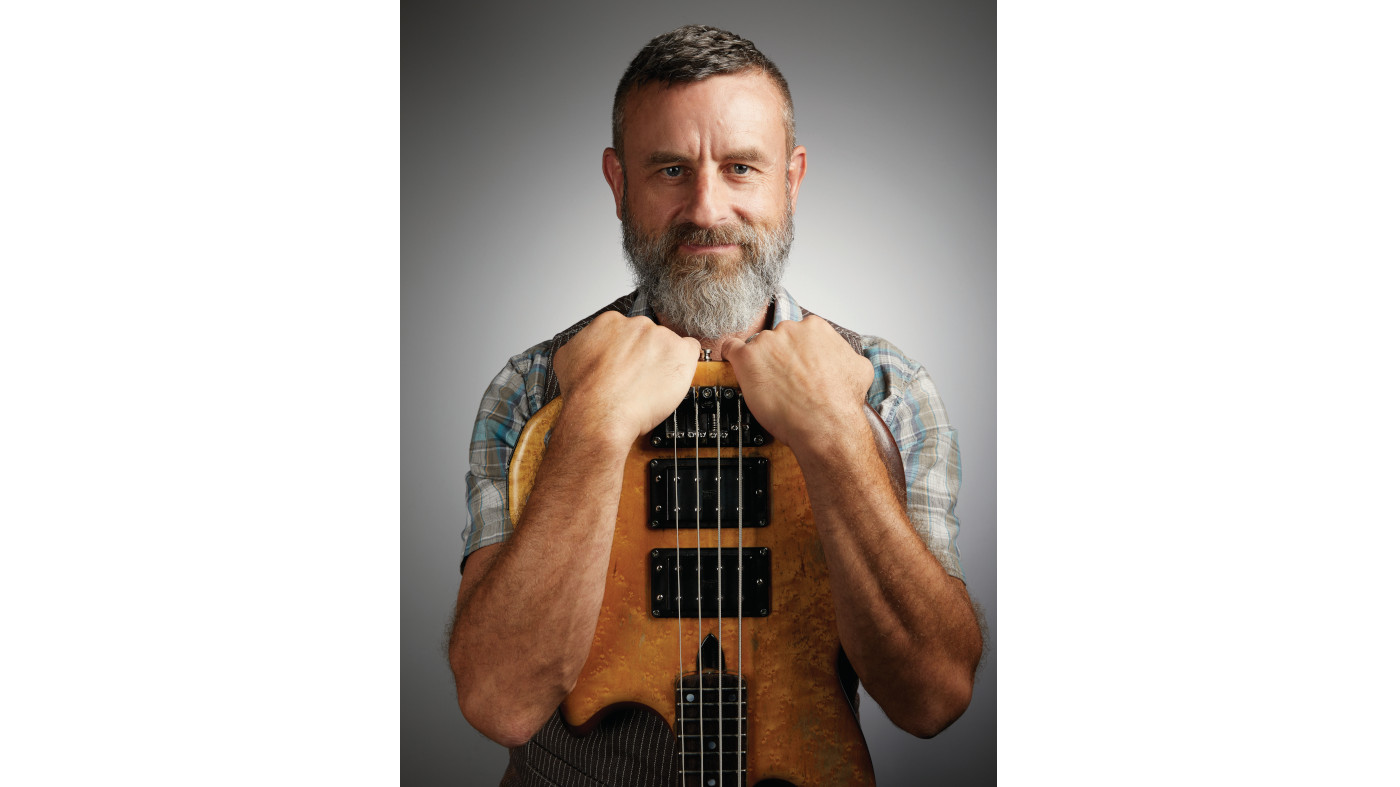Tool's Justin Chancellor: “We wouldn’t be satisfied with something that wasn’t taken as far as we could take it”
The bassist on the long wait for Fear Inoculum

Want all the hottest music and gear news, reviews, deals, features and more, direct to your inbox? Sign up here.
You are now subscribed
Your newsletter sign-up was successful
Tool, the thinking bassist’s prog band, haven’t released an album in 13 years. Fortunately their new one Fear Inoculum, is loaded with brain-melting virtuoso bass courtesy of the great Justin Chancellor. “I’m ashamed to say it, but I watch YouTube videos of our live shows” he confesses.
Things really shouldn’t have worked out for Tool, but against all the odds, they did. The three-quarters American, one-quarter British quartet has sold over 10 million albums over a three-decade career, won a fistful of Grammy awards, topped charts all over the world and still stayed on their own resolutely individual path.
There was nothing easy about their rise to worldwide prominence, especially as their last album, 10,000 Days, came out a whopping 13 years ago, but rise they did.
Playing with these guys, it’s a musical playground, pretty much
Singer Maynard James Keenan, guitarist Adam Jones, bassist Justin Chancellor and drummer Danny Carey are among the most accomplished rock musicians in the world, playing progressive metal of great esoteric opacity and somehow finding a mass market.
This is a good thing, of course, because Tool’s success reveals that there is a market for music which is traditionally regarded as difficult - music which only reveals its rich inner complexity after significant investment by the listener.
Spin a Tool album a few times, especially their new one, Fear Inoculum, and the journey that you’ll take will be long, rich, psychedelic, heart-stoppingly beautiful and not a little terrifying. This vibrant intricacy has been a key element of progressive rock by Yes, ELP, Caravan, King Crimson and others since the 1970s, and Tool, along with bands such as Karnivool, Isis, Opeth and Meshuggah, are keeping the progressive faith, supported by millions of fans.
We went to a playback of Fear Inoculum a while back and it’s difficult to express in words what it’s like, other than to point out that it contains seven or 10 tracks (depending on format) and that complex bass parts are at front and centre. You’ll have heard it by the time you read this, of course, so you’ll know that it’s heavy, with tons of staccato guitar riffs, that Keenan sings rather than roars, and that odd time signatures are everywhere.
Want all the hottest music and gear news, reviews, deals, features and more, direct to your inbox? Sign up here.
We sat and tried to figure them out and came up with a lot of sevens, which ties in with the theme of the album, it emerges - and Chancellor’s own songwriting preferences, as he tells us...
We last spoke to you in 2006, Justin.
“It doesn’t seem like 13 years. Time flies when you’re enjoying yourself!”
It sounds like you’re having fun on the new album - so much space to play with, so many textures to explore.
“Well, how else are you going to pass the time for 13 years unless you’re having fun, you know? Playing with these guys, it’s a musical playground, pretty much. Everybody’s encouraged to go for it and discover whatever they can.”
How much of the music was arranged out, and how much was jammed in the studio?
“We had a lot of ideas kicking around over the years, even from the last couple of albums that never got used. We have a lot in the arsenal that we never get rid of - we keep our ideas in the back pocket.
"Obviously we’ve all been coming up with music over the years, and there’s always new, fresh ideas, so we mess around with the new, and with the old, and we exhaust every possible avenue to see if something works, or we look at something we already had that didn’t work before.
"It’s like using all the scraps, know what I mean? We try to be quite organic about it. The things that we have that we haven’t used, we cherish very deeply. We all write in different ways. For example, I tend to come up with things in weird time signatures.”
We noticed.
“Adam comes up with crazy percussive rhythms, so we marry them all together and find something that Danny can screw up even more, ha ha! He’s the grand poobah when it comes to listening to the mess that we’re playing around with.
"He’ll literally step in and go ‘Wait a minute, this all makes sense to me this way’ and we’ll look at him with open mouths and listen to his point of view. It’s really an alchemy, a real chemical experiment. And as you said, we’re having fun. We’re not in any rush to do anything.”
On the record
So if there’s so much music flying around, how do you decide what goes on the record?
“It’s kinda tough - we all have individual aspirations about what we want to hear, and if you write an idea, you tend to have a vision of how it’s going to come to fruition. But the way that our band works is that we have to find a thing that none of us have actually heard for it to get voted through. It has to be the newest version of all of our ideas.”
Are any of the songs your solo compositions?
“The last track, Mockingbeat, which I guess you’d call a segue, is a little more heavy on my side. As we were getting through the year in the studio recording the stuff, we maxed out the minutes that we could use on the physical album, but then we realised ‘Oh, we can still do segues because we’re actually going to release this digitally’, so we did three of them.”
Every time we record, and every time we go out live, we try and beat what we’ve already done
Have you changed up your signal chain much in the last few years?
“Every time we record, and every time we go out live, we try and beat what we’ve already done. We try and tweak the sound a little bit, but we must be doing something right because I end up using pretty much the same stuff, with the exception of a few individual pedals that we might use for particular sections.
"I still end up using a Mesa Boogie 4x12 cabinet from a Gallien-Krueger amp for the dirty signal, and a Mesa Boogie 8x10 cabinet from the second G-K amp, which is the clean signal. And then we use a DI. Me and Joe [Barresi, album producer] went through all the DIs again - the new ones, the stuff that people were loaning us and they liked - but we still ended up with exactly the same one, a Demeter.”
That’s amazing.
“Yeah. The songs might sound different, because the way I’m playing notes is a little different, but it still comes back to the same gear. Between myself and Adam and Joe and Danny, we end up pretty much in the same place.”
Are Wals still your main basses?
“Yes. My main Wal is responsible for most of what you hear, but I did use two other basses. One is a 1963 Lake Placid Blue P-Bass, which is probably my favourite bass to play around with at home. If I go and jam with someone, I always take that. It’s naturally nasty-sounding - you don’t have to put it through any kind of effects, because it has an amazing rasp.
"I used that on ‘Culling Voices’ when the bass comes in halfway through. It just worked for that part. And I also acquired a new Ernie Ball Music Man Stingray. Ernie Ball have given me strings forever, and when they were developing their new Stingray Specials last year, they asked me to go up to San Luis Obispo and give them some feedback. They made me a bass at the end of it.”
Does it have any particular specifications?
“Yes, they customised it for me. It’s got two humbuckers and two 12-volt batteries in the back, because I was looking for a bit more headroom up against the Wal bass, which has got some pretty heavy output. It also has a brass pickguard, which looks really cool but which I guess gives it a slightly different tone, too.”
So it made it onto the album?
“Yes, for the song Descending, which we’ve been playing a little bit of for years as a teaser. We went through every single bass that we had in the studio to see what worked best for the intro, which is basically a triplet high up on the fretboard, hammering on with the second finger.
"That bass ended up being by far and away the best one for the job. It just had the right tone: we used halfwound strings. I go back to the Wal in the middle of the song, where it gets all distorted and heavy, but we’ve been in Europe for a run of festivals and I’m getting used to playing that Stingray for the whole of the song.”

Click tricks
What effects did you use on Fear Inoculum?
“When it came to distortions, I always ended up with a Colorsound fuzz or a Sansamp, and occasionally there would be a part where we’d try some different choruses. I’m also developing a signature Crybaby wah pedal with Dunlop. It’s going to combine two different character wahs with an engageable distortion effect.
"There was also a delay pedal, a Providence I think, which was really cool because it had a digital readout. When we tracked the drums we didn’t use a click track, because Danny doesn’t like to play to a click. We did this painstaking process of going back through the drums and mapping a tempo click to his parts.”
That sounds tricky.
On this album I really learned a lot more restraint
“Well, on the second track, Pneuma, both the guitar and the bass have a pretty strong delay on a lot of the parts, but the tempo kind of goes up and down. We were able to actually get this pedal to track the tempo map, speeding up and slowing down as we played the part. That was interesting, because you get the natural feel of the drums, wanting to speed up and slow down, but the tempo stays in time with it.”
There are prominent bass parts of varying styles all over the new album. What was your intention when you went in to record?
“On this album I really learned a lot more restraint. On past albums, as far as I can see - although it’s hard to put it into words after all that time - I was pretty used to going full-bore and filling up the space, because my natural instinct is to hear all these different harmonies and orchestrations.
"This time, I’d write an idea that sounded good to me, as a melody or as an orchestrated part, and then Adam would end up playing it, and all of a sudden there was space for the bass to be just a bass, or maybe not even play for 30 seconds and then come in with a single pulsing note.
"We really figured out that we could create a greater space by pulling back a little bit and doing less. There’s a lot more simplicity, and the intensity and the complicated stuff is concentrated more into pockets, where it explodes that much more. I hope that’s the way it comes across, anyway.
"I take my hat off to Adam for his vision when it comes to arrangements, and then applying so much patience and restraint.”
Have you ever been approached to do a signature bass?
“Not really. I steer away from that, I guess. I’m very happy with what I have. I’m actually awaiting a brand-new Wal bass that they’ve just made me. It’s basically a modern version of my main bass, with the same kind of woods but with slightly lighter hardware.
"I don’t know what I did to my main bass - I’ve poured makeup into it, I’ve bashed it around - and we’ve gone in the back and cleaned it up. We changed the little parameters in the pots, and it sounds amazing and one of a kind at this point, but it picks up a really decent radio signal if you’re anywhere near an antenna.”
Like Spinal Tap?
“Exactly! I have to stand in one particular position in order not to pick it up, and if you put a distortion pedal on, forget it. So my tech came up and said, ‘Since Wal are back up and running, maybe we can get them to make you a modern version of it, maybe a little bit lighter?’, which we ended up achieving by using some slightly smaller tuning pegs.
"They put a lot of extra shielding in the electronics, for those moments when I’m getting 101.4 FM or Top 20 hits through my bass. I’m really looking forward to picking it up.”

Four-string force
You had a custom Warwick bass, correct?
“Yes. I was invited to the Warwick Bass Camp, which was a wonderful experience. I had the best time, not least driving my rented BMW on the autobahn on the way out there. Some really awesome people were there. It turns out that bass players are very, very cool.”
Who knew, right?
“We all hung out and were given a tour around the factory, and I ended up - because I couldn’t resist - saying that I’d love to get a bass made. I picked out the wood and they sent it out to me. It’s an absolute beauty. It’s very different- sounding from my Wal, so I’m still experimenting with pickups and different preamps and stuff, but it’s definitely going to be an epic bass.”
Do you play five- and six-string basses too?
If you can really try to kiss the strings, there’s a lot more music in it
“No, four is enough for me. There’s such a world to discover in what is in front of me already. I’ve already embraced playing the bass over the years to such a degree that it works for my body and my hands and the kind of frequency that I enjoy hearing. I can work in that realm and I can hear melodies down in that frequency. I’m a bit of a stickler about it.”
The super-low notes don’t tempt you?
“You know, there’s so much that you can find in one note that you could play in a million different ways, so I really don’t need an extra string on my bass. I mean, we do some songs like Parabola and old-school ones like Prison Sex which are in drop B, so I have a bass that’s tuned down for that, but it’s still four strings.
"Most of the new album is in drop-D. I think if I put a lower string below my lowest string, it would be confusing for me.”
You could always add a high C string - it would be useful for popped notes.
“I could do that, but I’ve got a whammy pedal for that. I’ll just hit the octave and go right up to the top string, all the way on my fretboard, and hit the whammy, and I’m as high as a guitar will go.”
How has your playing evolved over the years?
“I’m trying to be a little more sensitive with the bass. I’m ashamed to say it, but I watch YouTube videos of our live shows, wondering if it actually sounded the way it sounded when I was playing it, and the consistent thing I see is that you can feel the anxiety and the tension and it’s over-aggressive a lot of the time.
"If you can really try to kiss the strings, there’s a lot more music in it. Sometimes you get carried away in the moment, and you’re just trying to execute the track, but if you can actually trust in the music and pull back a little bit, it becomes way better.”

Live pressure
Do you still get stage fright?
“Oh yeah, yeah, for sure. Ha ha! Especially when you haven’t played for a while. We did two weeks in America before we went to Europe, and the first show was a massive festival. It was the Sunday night, the end of the festival, and we were playing two new songs that we’d never played ever before.
"We’d only ever played them twice with Maynard in rehearsal, so that was pretty terrifying, to completely give up and surrender and be completely vulnerable with everyone staring at us through this long, protracted intro.
"It was terrifying, really. But if you don’t take it seriously and you don’t think of the enormity of what’s about to go down, then you might get caught with your pants down. You could be taken by surprise, or your muscles might seize up because you’re not really prepared. You have to take all that into consideration, and appreciate the moment.”
You’re regarded as an accomplished bass player. Is is a source of pressure to know that the bass players in the audience are watching your every move?
We’re only alive for so long - are you going to keep on churning out average stuff, or are you going to keep pushing yourself
“No, I don’t think about that. I just want the song to sound amazing, and I want Danny and Adam and Maynard to feel comfortable and enjoy it as much as I’m enjoying it.
"It’s very rare that we play a gig and we all come off and say ‘That was great, I had a great time!’ There’s always someone that’s had a bad time. So the goal is always to achieve the next level of performing the piece that you’ve written. You’re looking for something that you haven’t even captured on the album.”
Do you mean making the bass-playing better?
“Yeah, but all of us, in the context of the band, want to embellish what’s going on in the song. I’m not thinking ‘Wow, that’s the best I’ve ever played’, ha ha!””
‘I really killed it tonight.’
“Yeah. ‘How about you guys?’ Not really. It’s a challenge to try and pull it off.”
When people ask you why it’s been 13 years since the last album, what do you say?
“I say, so what? What’s the big deal, what does it matter? Why is that even an issue?"
Well, because they’re Tool fans and they want to hear new music from you.
"I know, but we were trying to figure it out and do it the best we could.
"We wouldn’t be satisfied with something that wasn’t taken as far as we could take it. We’re only alive for so long - are you going to keep on churning out average stuff, or are you going to keep pushing yourself to the limit? Like the World Cup, it’s only every four years...”
What bit of bass are you most proud of on the new album?
“I was an aspiring guitar player when I was younger, and I get to do a lead guitar part, I guess you’d call it, in the middle of Invincible, where I was given complete free rein to turn up the amps, turn on every pedal, go into the room, stand right in front of the amps and let it rip with everything.
“I had a few crazy, Jimi Hendrix-inspired chord progressions, and it was pretty much ripped out in a couple of goes. We did a couple of run-throughs and did it. I could have spent a week being self-indulgent on that, ha ha! It just came out of me. And it was a big fight on the album for me.
"I was like ‘Come on, this is my one moment, let’s turn it up!’ so everybody gave me a Get Out Of Jail Free card and said ‘All right, this is your moment’. It’s not really a bass part, it’s more like a lead part - kind of a reward for keeping down the low end the rest of the time.”
Vindication at last! What did you use, an octaver?
“It’s delay, flanger, chorus, distortion, whammy pedal on the octave setting, and then just full up into white noise. There’s a lot of switching between high and low octaves. I spent a long time working on one particular chord progression that crops up in the middle of it.
"It’s a little weird, but it comes out great. Because it’s so crazy, I always think when I’m playing it live that people are going to think that I’m messing up royally. But that’s the funny thing with these new tracks. As Danny and Adam keep pointing out, ‘The great thing is, no- one’s heard these songs before, so no-one knows that you’re fucking up’, ha ha!”
Gear
Justin was kind enough to email his current gear list over. This is it, the definitive and correct list of items that he uses, straight from the horse’s mouth.
Basses: Wal, Ernie Ball Music Man Stingray, Hamer 12-string, Fender 1963 Precision, Ernie Ball strings
Effects: Radial JD7, Demeter DI, Boss, Digitech, Dunlop pedals, Colorsound, Foxx wah, Guyatone BR2, Heil, Sennheiser, Neumann
Amps: Gallien-Krueger 2001RB, Mesa Boogie cabinets

